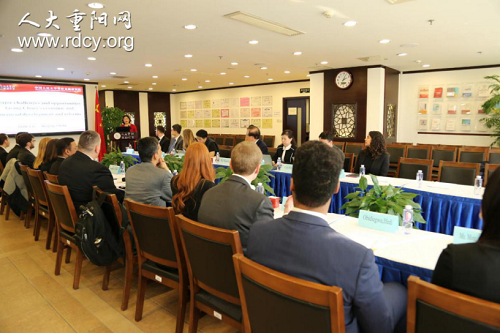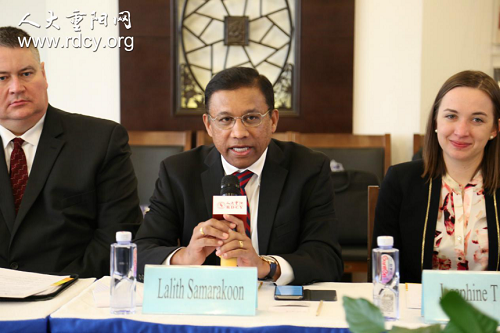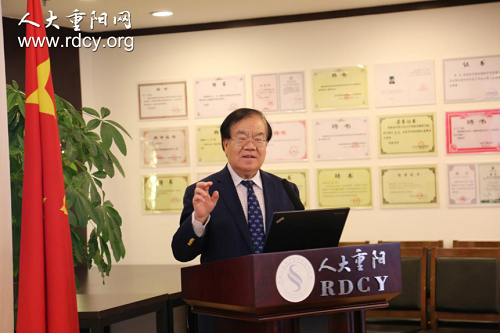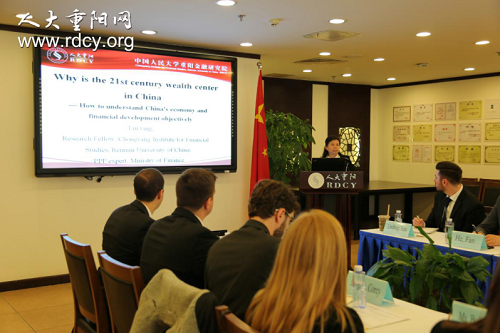Picture
Your Present Location: HOME> PictureMBA delegation of University of St. Thomas visits Chongyang Institute for Financial Studies at RUC
On January 6th, 2020, MBA delegation of University of St. Thomas in the US visits Chongyang Institute for Financial Studies at Renmin University of China (RDCY) and participates in the academic communication, host by China-US People-to-People Exchange Research Center, Renmin University of China. The delegation consists of 3 professors and 17 MBA students whose majors are economics and finance. The academic exchange is presided by Yang Qingqing, Assistant Dean of RDCY.
The academic exchange aims to enhance the American professors and students’ comprehension of China’s development and China’s relationship with the world , and to promote mutual understanding and Sino-US humanities exchanges through introducing China’s economy and finance condition, achievements of the reform and opening up as well as present challenges and risks.

Lalith Samarakoon, Professor of University of St. Thomas and Secretary-General and Chief Economist of the National Economic Council of Sri Lanka delivers a speech. First of all, Lalith expresses thanks for RDCY entertaining the MBA students delegations of University of St. Thomas in the past three years. Each communication with Chinese think tanks scholars enables American teachers and students to have a deeper understanding about China’s latest development, greatly enriching teaching contents and broadening students’ horizons. He also wishes that this academic communication will promote Sino-US culture exchanges and make more people know China and China’s development pattern. Moreover, Lalith says that China’s economy has entered the “new normal” stage, but it still faces complicated international and domestic situation. Not only China, but also other countries pay great attention to how China deal with the relationship between comprehensively deepening reform and seeking development, specifically comprehensively deepening capital market reform while actively tackling all sorts of risks and challenges.

Wei Benhua, Former Deputy Administrator of the State Administration of Foreign Exchange (SAFE), Senior Fellow of RDCY gives a keynote address on Chinese Financial System. Focusing on four aspects of Chinese foreign exchange policy,the People’s bank of China functions,internationalizing the renminbi and digital currency, Wei elaborates the foundation and development of Chinese currency system, as well as the evolution of foreign exchange policy. Wei reckons that, there is still a long uphill journey to realize renminbi internationalization. On the promise of maintaining stable economic growth and with reforms in financial policies, China can promote the universal recognition and actual use in the international currency system.

Liu Ying, a research fellow in RDCY, delivers a speech on “Why is the 21st century wealth center in China? —How to understand China’s economy and finance development objectively? ” She refers that China’s economic development , many Americans think, is full of risks and uncertainty, and US president Donald Trump said that China’s economy fell to a record low for 27 years. In fact, however, China-US trade in goods has increased 252 times form 1979 to 2018. What’s more, starting this year.China not only boasts the best infrastructure and the fast economic growth, but also makes the biggest contributions to the world. By all sorts of statistics and development tendency, we should hold an objective view about China’s economy and finance development.

In the discussion and Q&A part, the delegation of University of St. Thomas and researchers of RDCY give an open and warm exchange on the topics like the tendency and potential of China’s economic development, “ Belt and Road” initiative (BRI) construction as well as China-US trade and the bilateral relationship. Guan Zhaoyu, associate researcher of RDCY, refers that American enterprises, according to many Americans, cannot benefit from the BRI. However, the BRI construction can provide new development opportunities for American companies. General Electric (GE), for instance, acts as a strong partner in the BRI construction. Benefited from the energy and electricity projects in the construction, gas turbine and other energy facilities orders from Chinese electricity enterprises have grown rapidly. Wang Peng, associate researcher of RDCY expresses his opinions about China-Sri Lanka cooperation on Hambantota port project and the so called “debt crisis”. Wang believes that debit problems exist in many international cooperation projects, including BRI. To fundamentally solve the debit problem in these projects, the key point does not lie in the port construction, but beyond it. The industrial parks should operate well, then they can bring sustainable return to pay debits, promote local economy and benefit the people.
In the end, both sides agree that such communication enhances the US understanding about China, and hope to strengthen mutual communications and interactions in the future.























































































 京公网安备 11010802037854号
京公网安备 11010802037854号





